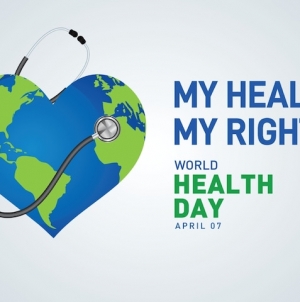-
CANBERRA: India-Australia partnership aims to bridge skill gap for future employment - April 15, 2024
-
HOUSTON: Mumbai boys in the final rounds of FIRST World Robotics competition to be held in Houston - April 14, 2024
-
MADRAS: IIT Madras NPTEL translates thousands of technical courses into several regional languages - April 10, 2024
-
MUMBAI: Shahid Kapoor opens up about the challenges faced by character actors in Bollywood - April 8, 2024
-
NEW DELHI: World Health Day 2024: Date, Theme, History, Significance and Interesting Facts - April 6, 2024
-
LONDON: Indian-Origin Teen In UK Gets “Life-Changing” Cancer Treatment - April 3, 2024
-
BENGALURU: Indian scientists unravel genetic secrets behind lumpy skin disease outbreak - March 30, 2024
-
NEW DELHI: Youngsters’ Increasing Stress Levels, Early Onset of Diseases an Alarming Health Trend: Apollo Hospitals Chief - March 28, 2024
-
MARYLAND: All About Pavan Davuluri, New Head Of Microsoft Windows - March 27, 2024
-
MUMBAI: Pyaar Kiya To Darna Kya turns 26: Kajol says THIS was the symbol of an innocent girl back then - March 27, 2024
ROME : What to Know About Red Meat, Processed Meat, and Heart Health
ROME : Health experts have long suspected that eating too much meat can have a detrimental effect on our health.
But in November 2019, a controversial study published in the Annals of Internal MedicineTrusted Source suggested that meat might not be as harmful as people once thought, and claimed there wasn’t evidence of meaningful health benefit from reducing our red or processed meat intake.
The study conflicted with previous scientific opinions on the risks of eating too much meat, and led to many debates about the benefits, risks, and harms of meat consumption.
Now, researchers from Northwestern Medicine and Cornell University took a closer look at the impact of meat on our health and found that eating too much unprocessed and processed meat (like pepperoni, bologna, and deli meats) does, in fact, increase your risk of heart disease and death.
Those who ate higher amounts of processed meat, unprocessed meat or poultry, but not fish, were significantly associated with a slightly higher risk of heart disease.
People who ate higher amounts of processed and unprocessed meat, but not chicken or fish, were strongly associated with a slightly higher risk of death, according to the new studyTrusted Source published in JAMA Internal Medicine on Monday.
“Findings of this study suggest that people may obtain further health benefits through reducing unprocessed red meat and processed meat intake in addition to adoption of a healthy lifestyle including regular exercise and frequent consumption of fruits and vegetables,” the study’s lead author Victor Zhong, PhD, an assistant professor of nutritional sciences at Cornell, told Healthline.
Eating meat was linked to a slightly higher risk
Researchers looked at the health data of nearly 30,000 adults who had no history of cardiovascular disease (CVD) at baseline and provided follow-up data for up to three decades.
Information about the participants’ diets was self-reported via a food frequency questionnaire or diet history.
The researchers had standardized the serving sizes: One serving constituted 4 ounces of unprocessed red meat or poultry, or 3 ounces of fish. Regarding processed meat, one serving was 2 slices of bacon, 2 links of sausage, or 1 hot dog.
Then, the researchers tracked the number of cardiovascular events, including strokes, heart failure events, and CVD deaths.
The researchers found that people who ate two servings of red meat — but not fish — a week were linked to a 3 percent higher risk of heart disease and premature death. That risk went up to 7 percent for processed red meat.
Those who ate two servings a week of poultry were associated with a 4 percent higher risk of heart disease, though the researchers say there’s not enough evidence to make a clear recommendation about poultry.
The researchers found no associations between fish consumption and heart disease or death.
What is it about meat?
Meat is a good source of protein, vitamins, and minerals, but it’s still unclear why too much of it may be harmful to our health.
“The biological mechanisms underlying the associations of unprocessed red meat and processed meat intake with heart disease have not been fully understood,” Zhong said.
Zhong suspects it may be due to the high levels of saturated fat, dietary cholesterol, heme iron, and added sodium in certain types of meat. These dietary factors are all associated with a handful of heart health conditions, including hypertension, high cholesterol, vascular stiffness, insulin resistance, and diabetes.
Dr. Nicole Harkin, a board-certified cardiologist and lipidologist with Manhattan Cardiovascular Associates, says eating a lot of red meat increases blood pressure and cholesterol levels, two big risk factors for heart disease.
“Consumption of meat also may have other adverse effects on the heart and vascular system that we are still investigating, such as adversely affecting the lining of the blood vessels, called endothelial dysfunction,” Harkin added.
It may also mess with our gut microbiome, something scientists are just learning is an important component for heart disease risk, Harkin said.
Do you need to give up meat?
So, is there a safe amount of meat intake? According to Zhong’s new study, most meat consumption carries a higher risk.
“Our study did not find a safe consumption amount for unprocessed red meat and processed meat. Only zero consumption was associated with no increased risk of heart disease and premature death,” Zhong said.
Harkin advises her patients to eat red meat rarely — about once to twice a month, at most — and to avoid processed meat.
She also recommends eating more vegetables, fruits, whole grains, and beans — all things that can help lower your risk of heart disease and keep you healthy.
“While we do not know an exact amount of meat that is ‘acceptable’ (and this probably varies from person to person due to other factors such as genetics, environment, and other lifestyle choices), this study and others indicate a dose response relationship: The more meat consumed, the higher the risk of heart disease,” Harkin said.
The bottom line
New research has found that eating too much unprocessed and processed meat (like pepperoni, bologna, and deli meats) increases your risk of heart disease and death.
This new study follows a controversial report that came out November 2019 suggesting that lowering your meat intake has no effect on heart health.
Health experts suspect meat has this effect because it contributes to higher blood pressure and cholesterol levels, two huge risk factors for heart disease.
























